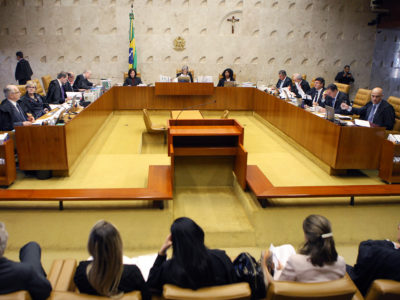
STF and the printed vote: what can we do?
Author: Lucas Berlanza for Gazeta do Povo
Our feelings and suspicions, the will objectively expressed by society, through the Legislative Power, to have an auditable system, to install printing in the urns, established and agreed upon nothing less than three years ago, and in line with many of the world’s most developed countries – all of this was simply ignored by the Supreme Federal Court. Ms. Cármen Lúcia and her tyrannical robed judges, appointed by the extreme left in the Lula-Petista era, or by presidents from the so-called establishment, preferred to arrogate themselves to the function of promoters of the “progress of institutions” and to decree that the sovereign decision of another power of the Republic would be only a “setback”.
We do not intend to write anything else here defending the propriety of the printed vote law. This subject, we repeat, has already been discussed for three years and has been decided. What the STF did was, once again, in a confrontational, anti-republican, and authoritarian manner, to replace the prerogatives of another power on the mat and cast legitimate discredit on the 2018 elections. The ministers of the STF are not deputies. By wanting to act as such, they establish an origin defect for the entire election.
There simply is no definitive logical argument, leaving everything as it is, to consider any challenge to the October result to be dismissed, especially in the case of a candidate’s victory by a small margin. This crucial defeat of the Brazilian people is also on the account of many liberals and conservatives who did not lift a finger, with honorable exceptions, to give this urgent agenda the relevance it deserved.
What to do then? We always agreed with all Burkean reservations before embarking on complete institutional rupture solutions. By adopting these solutions, anything can happen, including everything that the proposers do not wish for. On the other hand, simply saying that we need to be cautious and prudent and seek solutions that do not involve the complete annihilation of the established constitutional order, without any serious effort to effectively point out what these solutions would be, is a complacent and insensitive posture that we abhor almost in the same proportion.
Something must be presented, because Brazilian society has an urgent and real demand and needs exits. It is not enough to just say “let’s be quiet, let’s bow our heads, because it is better to avoid military coups or revolutions,” without any other recourse. It would be ridiculous to want people to just accept that. What, then, can we still do at this moment without resorting to anything goes?
To fight against the STF and against the legitimate mistrust established about the elections, there are some paths that can be followed now, still within the institutional channels, not necessarily excluding each other. All of them go through one thing: expressive street demonstrations, opinion makers, and organized movements in civil society.
We cannot accept what the tyrants of the Supreme Court want to impose on us. It is the minimum credibility of our democratic-representative system that is at stake. It is at stake whether we will be a country that accepts that, during sessions, spending the hard-earned money of the people and even telling jokes, talking about everything except the Constitution, eleven people render the entire Legislative Power useless and play gods. We need, once and for all, to face this problem as the most important of all, because it is at the base of the entire system that underpins our political life. Demonstrations, organized mobilizations, now! To demand what?
We need to pressure Congress to take a firm stance and defend its prerogatives, using all appropriate means, including the installation of a Parliamentary Inquiry Commission. We need to demand that they challenge the Supreme Court. Our lawmakers – especially Jair Bolsonaro himself, the author of the printed ballot project and currently leading in the polls – should be urged to fight back and rise up against the tyranny of the Supreme Court! Will they be interested in this? Many may not. Perhaps they agree with the same strange interests that make the Supreme Court want to trample on their prerogatives. Maybe they don’t have an ounce of honesty to defend their rights and the extent of the powers they represent. In that case, democracy is really dead. However, we cannot bury it without making a lot of noise, a lot of noise, to try to save it. We need to demand an auditable system.
Another tool we can use is to resort to the International Criminal Court, as suggested by the professor, former prosecutor, former attorney and post-doctorate in Electronic Government, Hugo Hoeschl, in an interview with investment specialist and conservative activist Leandro Ruschel. We can and should internationally denounce the affront to our fundamental right as citizens participating in the choice system in our country, stolen by those who cannot have any interest other than leaving the possibility of interference in the electoral ritual widely open.
The real enemy in this case, however, is the Supreme Court. The Supreme Court justices, mostly appointed by Lula and Dilma, need to be brought down. In this sense, Fabio Florence, a Ph.D. candidate in Political Philosophy and a professor in online courses at Universidade Jerônimo, drew attention to bill 4754/2016, which criminalizes the usurpation of competence by the Federal Supreme Court judges from the Legislative or Executive Branches. Well, that is exactly what is happening! The bill is ready to be scheduled in the Committee on Constitution and Justice and Citizenship.
Florence’s observation is very happy and timely. The pressure should also be for this bill to be passed so that we can remove the Supreme Court justices, and for this purpose, society must express its repudiation of judicial activism with volume and drive.
Difficult? Useless? Will no one do anything? My dear friends, if some of us are already calling for “general action” against the crisis that is corroding our institutions, then at the very least, as a society, we have a situation that justifies our total and massive involvement. If the enemy is so powerful and intolerable, we need to focus and take the reins. Let’s fight. We still have weapons and have a moral duty to use them. Time is running out.




